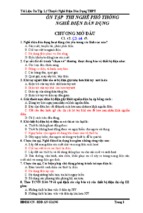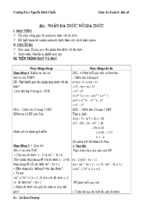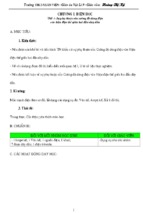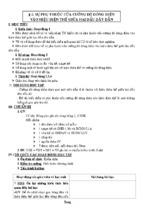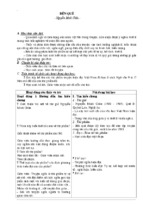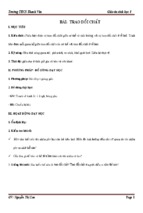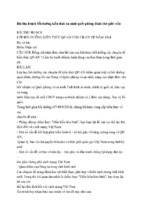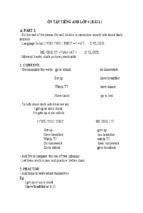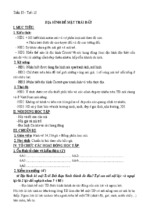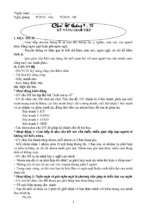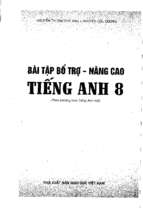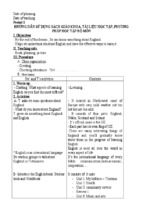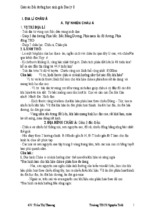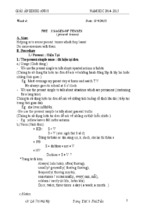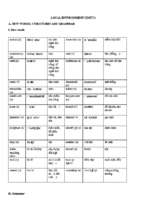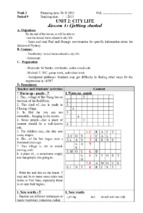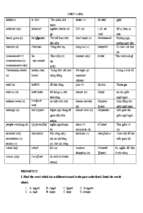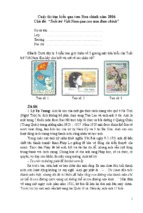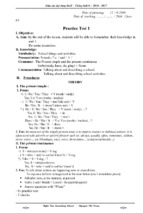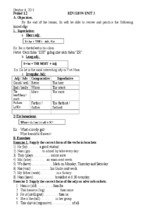We
-ek UNIT
Perio-d PART Knowledge Methods Teaching aids
Addi-tion
1 1 1 Getting started (U 1) - Use the lexical items related to traditional crafts and places of interest in an area
- Listen and read for general and specific information about a traditional craft village
Pair work, group work,individually… -Tape - Pictures
- Posters
2 A closer look 1 - Use the lexical items related to traditional crafts and places of interest in an area
- Listen and say sentences with correct stress on content words Pair work, group work, matching, individually -Tape - Pictures
- Posters
3 A closer look 2 - Use the lexical items related to traditional crafts and places of interest in an area
- Use complex sentences and some common phrasal verbs Repeat, matching, pair work , group work. - Pictures
- Posters
2 4 Communication& Project - Listen and get some information then talk to plan a day out to a place of interest in an area
- Use complex sentences and some common phrasal verbs Repeat,matching,
pair-work,
group work -Tape, - Pictures,
- Posters
5 Skills 1 - Read and get some information then talk about the topic of places of interest and the conical hat.
- Use complex sentences and some common phrasal verbs Repeat, matching, pair-work , group-work - Pictures,
- Posters
6 Skills 2 - Listen and get some information then write about the topic of places of interest.
- Use complex sentences and some common phrasal verbs Eliciting, body language, groupwork, game, matching... -Tape, - Pictures,
- Posters
3
7 Looking back review and do exercises about the vocabulary and the grammar notes they have learnt during this unit. Eliciting, body language, groupwork, game, - Pictures,
- Posters
2 8
Getting started (U2) - Use the lexical items related to city life
- Listen and read for general and specific information about Sydney Luckynumber, groupwork, pairwork, ask and answer... -Tape - Pictures
- Posters
9 A closer look 1 - Use the lexical items related to city life
- Listen and say sentences with correct stress on pronouns Matching , groupwork, pairwork, ask and answer.
-Tape - Pictures
- Posters
4 10 A closer look 2 - Use the lexical items related to city life
- Use the comparison of adjectives and adverbs; common phrasal verbs Groupwork, pairwork, ask and answer. - Pictures
- Posters
11 Communication - Read and get some information about city life in some famous cities in the world then write and talk.
- Use the comparison of adjectives and adverbs; common phrasal verbs Eliciting, body language, groupwork, game, matching... -Tape, - Pictures,
- Posters
12 Skills 1 - Read and get some information about the best city in the world to live in and talk about your own town/ city.
- Use the comparison of adjectives and adverbs; common phrasal verbs Eliciting, body language, groupwork, game, - Pictures,
- Posters
5 13 Skills 2 - Listen and get some information then write about the topic of city life.
- Use the comparison of adjectives and adverbs; common phrasal verbs Luckynumber, groupwork, pairwork, ask and answer... -Tape, - Pictures,
- Posters
14 Looking back
& Project review and do exercises about the vocabulary and the grammar notes they have learnt during this unit.
Matching , groupwork, pairwork, ask and answer.
- Pictures,
- Posters
3 15
Getting started (U3) - Use the lexical items related to changes in adolescence.
- Practice listening and speaking with the lexical items related to the topic Groupwork, pairwork, ask and answer. -Tape - Pictures
- Posters
6 16
A closer look 1 - Use the lexical items related to changes in adolescence.
- Identify in which situations to stress the verb be in sentences and say these sentences Eliciting, body language, groupwork, game, matching... -Tape - Pictures
- Posters
17
A closer look 2 - Use the lexical items related to changes in adolescence.
- Use reported speech with confidence, question words before fo-infinitive Eliciting, body language, groupwork, game, - Pictures
- Posters
18
Communication - Read and get some information then talk about “Life skills for teens”
Luckynumber, groupwork, pairwork, ask and answer... - Pictures
- Posters
7
19 Skills 1 read a passage about community service and volunteer work; talk about community service and volunteer work. Groupwork, pairwork, ask and answer, open prediction ... -Tape, - Pictures,
- Posters
20
Skills 2 - Listen for general and specific information about the work of an advice columnist
- Write a short note to ask for advice and to give advice
Groupwork, pairwork, ask and answer, open prediction ... -Tape, - Pictures,
- Posters
21 Looking back & Project -Revise section of the unit. Groupwork, pairwork, ask and answer - Pictures,
- Posters
8 22 Review 1 SS review vocab, grammar, and practice exercises , communication
Groupwork, pairwork, ask and answer. -Tape, - Pictures,
- Posters
23 Review 1 (cont) SS review vocab, grammar, and practice exercises , communication
Groupwork, pairwork, ask and answer. -Tape, - Pictures,
- Posters
24 Check 45’ (1) Check the pronunciation, the vocabulary and the grammar notes they have learnt from unit 1to 3 individual Tape
9
4 25
Getting started ( U4) - Read and get some information then talk about “Life skills for teens”
Group works, pair work, ask and answer.
-Tape, - Pictures,
- Posters
26
A closer look 1 - Use the lexical items related to changes in adolescence.
- Identify in which situations to stress the verb be in sentences and Group works, pair work, ask and answer, LN, Networks, Write it up, Guessing. -Tape, - Pictures,
- Posters
27
A closer look 2 - Use the lexical items related to changes in adolescence.
- Use reported speech with confidence, question words before fo-infinitive Individual, pair works, ask and answer, ordering, word square
-Tape, - Pictures,
- Posters
10 28
Correction (1)
Realize the mistakes or the false and correct their test. group works, pair works, ask and answer.
-Tape,
- Posters
29
Communication - Read and get some information then talk about “Life skills for teens”
Individual, pair works, ask and answer, ordering, word square
- Pictures,
- Posters
30 Skills 1 - Read for general and specific information about a helpline service for teens in Viet Nam
- Talk about teen stress and pressure and how to cope with them Individual, pair works, ask and answer, ordering.
-Tape, - Pictures,
- Posters
11 31 Skills 2 - Listen for general and specific information about the work of an advice columnist
- Write a short note to ask for advice and to give advice Group works, pair works, ask and answer. -Tape, - Pictures,
- Posters
32 Looking back & Project to review and do exercises about the vocabulary and the grammar notes they have learnt during this unit.
What and where, open-prediction, group works, pair works, ask and answer.
- Pictures,
- Posters
5 33
Getting started (U 5) - Use the lexical items related to “life in the past”
- Practice listening and speaking with the lexical items related to the topic
Open-prediction, what and where, group works pair works, ask and answer.
-Tape, - Pictures,
- Posters
12
34 A closer look 1 - Use the lexical items related to “life in the past”
- Identify in which situations to stress auxiliary verbs in sentences and say these sentences correctly. Lucky number, group works, pair works, ask and answer.
-Tape, - Pictures,
- Posters
35
A closer look 2 - Use the lexical items related to “life in the past”
- Use used/didn't use + to-infinitive to talk about past practices.
- Express wishes for the present. group works pair works, ask and answer.
- Pictures,
- Posters
36
Communication - Use the lexical items related to “life in the past”
- Read for specific information about pastimes in the past Lucky number, group works, pair works, ask and answer.
-Tape, - Pictures,
- Posters
13
37 Skills 1 - Read for specific information about children's pastimes in the past - Pictures,
- Posters
38
Skills 2 - Listen for specific information about school life in the past
- Write a description of how children in the past studied without technology -Tape, - Pictures,
- Posters
39 Looking back & Project review and do exercises about the vocabulary and the grammar notes they have learnt during this unit.
Matching, group works, pair works, ask and answer, writing. Grid, word cue drill, find someone who, pair works, group works, writing.
-Tape, - Pictures,
- Posters
14
40
Check 45’ (2) Check the pronunciation, the vocabulary and the grammar notes they have learnt from unit 4to 5. individual
-Tape,
6 41
Getting started
(U 6) -Use the lexical items related to changes in transport systems, family groups, and school life in Viet Nam in the past and at present.
Open-prediction, lucky numbers, survey, pair works, group works.
-Tape, - Pictures,
- Posters
42
A closer look 1 -Identify in which situations to stress all the words in sentences and say these sentence
Groupwork, pairwork, ask and answer -Tape, - Pictures,
- Posters
15 43 A closer look 2 Use the past perfect correctly
use the structure adj + to-infinitive and adj + that-clause correctly Slap the board, word cue drill, noughts and crosses, pair works, group works.
-Tape, - Pictures,
- Posters
44 Correction (2) to realize the mistakes or the false and correct their test. Group works, pair works, ask and answer.
- Posters
45 Communication read for general and specific information about the tram system in Ha Noi then and now. pair works, group works, guessing game. -Tape, - Pictures,
- Posters
16 46
Skills 1 talk about changes in transport in the neighbourhood and express opinions about these changes Matching, ordering statements, ask and answer, pair works, group works. -Tape, - Pictures,
- Posters
47
Skills 2 listen for general and specific information about life in an extended family
• write about some qualities a person needs to get along in an extended family Pair work, Ask and answer , LN.
-Tape, - Pictures,
- Posters
48 Looking back & Project use the lexical items related to changes in transport systems, family groups, and school life in
Viet Nam in the past and at present Pair work, Ask and answer , LN.
-Tape, - Pictures,
- Posters
17 49
Review (2) SS review vocab, grammar, and practice exercises , communication
Pair work, Ask and answer , LN.
- Posters
50 Review (2) (Cont)
SS review vocab, grammar, and practice exercises , communication
Pair work, Ask and answer , LN.
- Posters
18 51
Corection individual - Posters
52
Corection individual - Posters
19 53
Check of the first semester individual
54 Correction of the first semester to realize the mistakes or the false and correct their test. Pair work, Ask and answer , LN.
Tiết dự phòng
Tiết dự phòng
PHÒNG GIÁO DỤC – ĐÀO TẠO MỘ ĐỨC
TRƯỜNG THCS ĐỨC THẠNH
-------- -------
KẾ HOẠCH BỘ MÔN
TIẾNG ANH
LỚP 9
Giáo viên : Nguyễn Thị Ngọc Lựu
Năm học: 2017-2018
***********
PHÒNG GD - ĐT huyện MỘ ĐỨC
Trường THCS Đức Thạnh
KẾ HOẠCH BỘ MÔN ANH VĂN 9
I.ĐẶC ĐIỂM TÌNH HÌNH
Tiếng Anh là môn học khó với các em học sinh . Do đó trong quá trình giảng dạy cũng như quá trình học tập
của các em, đòi hỏi giáo viên và học sinh đều phải kiên trì. Bên cạnh đó, trong quá trình giảng dạy của giáo viên
và học của học sinh có nhiều thuận lợi nhưng cũng gặp nhiều khó khăn không thể tránh khỏi.
1. Thuận lợi
a.Đối với GV
-Dạy đúng chuyên môn được đào tạo.
-Tham gia đầy đủ các buổi học bồi dưỡng chuyên môn nghiệp vụ.
-Dạy trường gần nhà
- Bản thân nhiệt tình, cố gắng tự học tập học hỏi ý kiến của các bạn đồng nghiệp.
b.Đối với học sinh
-Có đầy đủ sách giáo khoa, dụng cụ học tập .
2.Khó khăn
a.Đối với giáo viên
- Đa số học sinh lười học ,phần đông học sinh học yếu môn tiếng Anh
b.Đối với học sinh :
- Là bộ môn ngôn ngữ nước ngoài nên quá khó đối với các em. Chưa có đầy đủ phương tiện học tập, Các em ít
sử dụng sách bài tập, sách tham khảo, ít học tổ, nhóm. Lượng kiến thức tiếp thu được trong 1 tiết còn quá
nhiều. Nhiều em ba mẹ đi làm ăn xa ,không có ở nhà , ở với người thân .Điều này ảnh hưởng đến
việc học tập của các em rất nhiều
3.Kết quả học tập bộ môn của năm học trước
lớp 9B
GIỎI
%
KHÁ
%
TB
%
YẾU
%
Đăng kí kết quả học tập bộ môn của năm học 2017-2018
lớp 9B
GIỎI
KHÁ
10%
30%
Kết quả học tập bộ môn của năm học 2017-2018
TB
55.5%
YẾU
4.5%
lớp 9B
HKI
HKII
CN
TB
YẾU
GIỎI
KHÁ
II/ MỤC TIÊU:
Chương trình tiếng Anh THCS được xây dựng và phát triển theo các nguyên tắc cơ bản sau:
● Đáp ứng nhu cầu và khả năng học tiếng Anh của học sinh, phù hợp với yêu cầu và khả năng của xã hội đối
với môn tiếng Anh.
● Đảm bảo phát triển ở học sinh tình cảm và thái độ tích cực đối với việc học tiếng Anh, với ngôn ngữ tiếng
Anh, với đất nước, con người, nền văn hóa của các nước nói tiếng Anh, đồng thời cung cấp cho các em những
trải nghiệm học tập tích cực và thú vị.
● Đảm bảo việc học tiếng Anh góp phần vào sự phát triển chung của học sinh, vào việc đề cao các giá trị đạo
đức và văn hóa phù hợp với việc tham gia của các em vào đời sống xã hội Việt Nam.
● Đảm bảo mục tiêu phát triển năng lực giao tiếp tiếng Anh cho học sinh. Năng lực ngôn ngữ giao tiếp là khả
năng sử dụng hệ thống ngôn ngữ như ngữ âm, từ vựng và ngữ pháp để giao tiếp có hiệu quả, phù hợp với những
ngữ cảnh giao tiếp có nghĩa. Năng lực ngôn ngữ giao tiếp được thực hiện chủ yếu thông qua luyện tập thực
hành tích hợp bốn kỹ năng nghe, nói, đọc, viết. Hệ thống kiến thức ngôn ngữ như ngữ âm, từ vựng, ngữ pháp là
phương tiện, điều kiện hình thành và phát triển các kỹ năng giao tiếp.
● Ở các lớp 6 và 7, các kỹ năng giao tiếp khẩu ngữ vẫn được tiếp tục ưu tiên phát triển thông qua các nhiệm vụ
giao tiếp nghe - nói tương tác, dựa trên nền tảng mà học sinh đã học được qua Chương trình tiếng Anh Tiểu
học. Ở các lớp 8 và 9, các kỹ năng đọc và viết sẽ được phát triển cân bằng với các kỹ năng nghe và nói.
● Nội dung chương trình được xây dựng và phát triển trên cơ sở hệ thống chủ điểm/chủ đề liên quan chặt chẽ
với nhau, có ý nghĩa và phù hợp với môi trường học tập và sinh hoạt của học sinh. Hệ thống chủ điểm/chủ đề
được thiết kế lặp lại có mở rộng qua các năm học theo hướng đồng tâm xoáy trôn ốc nhằm củng cố và nâng cao
năng lực giao tiếp của học sinh.
● Đảm bảo lấy hoạt động học của học sinh làm trung tâm của quá trình dạy và học. Năng lực ngôn ngữ giao tiếp
của học sinh được phát triển thông qua hoạt động học tập tích cực, chủ động, sáng tạo, dưới sự hướng dẫn của
giáo viên, trong mối tương tác với học sinh và các tài liệu học tập, theo những chiến lược và phương thức học
tập hiệu quả, trong các tình huống giao tiếp có ý nghĩa, qua đó khuyến khích học sinh từng bước nâng cao khả
năng tự học.
● Đảm bảo tính liên thông và tiếp nối của việc dạy và học tiếng Anh giữa các cấp Tiểu học, THCS và THPT.
● Đảm bảo tính linh hoạt và mềm dẻo của chương trình nhằm đáp ứng nhu cầu và điều kiện dạy và học tiếng
Anh khác nhau giữa các vùng miền và địa phương ở Việt Nam.
● Đảm bảo sau khi học xong Chương trình tiếng Anh THCS, học sinh đạt trình độ năng lực giao tiếp tiếng Anh
tương đương với Cấp độ A2 của Khung Tham chiếu Chung Châu Âu về Ngôn ngữ (CEFR).
+ Mục tiêu chung
Dạy và học tiếng Anh ở THCS nhằm giúp học sinh rèn luyện và phát triển năng lực giao tiếp tiếng Anh một
cách chủ động và tự tin, tạo tiền đề cho việc sử dụng tiếng Anh như một công cụ trong học tập và trong đời
sống xã hội, góp phần hình thành thói quen học tập suốt đời, tạo cơ sở cho việc hoàn thiện bản thân để trở thành
những công dân có trách nhiệm trong thời kỳ hội nhập quốc tế.
Về tổng thể, sau khi học xong Chương trình tiếng Anh THCS, học sinh có thể đạt được năng lực giao tiếp tiếng
Anh tương đương Cấp độ A2 của Khung Tham chiếu Chung Châu Âu về Ngôn ngữ. Cụ thể là:
Có khả năng hiểu các câu nói và các cách diễn đạt được sử dụng thường xuyên liên quan đến những lĩnh vực
gần gũi nhất trong đời sống thường nhật (ví dụ như các thông tin rất cơ bản về cá nhân, gia đình, mua bán, cộng
đồng địa phương và công việc). Có thể giao tiếp trong các tình huống cơ bản và đơn giản đòi hỏi các trao đổi
thông tin đơn giản và trực tiếp về các vấn đề gần gũi và quen thuộc. Có thể sử dụng các cách nói đơn giản để
nói về bản thân, môi trường gần gũi và những vấn đề liên quan đến nhu cầu trực tiếp.
+ Mục tiêu cụ thể
Sau khi kết thúc Chương trình tiếng Anh THCS, học sinh có khả năng:
● Sử dụng tiếng Anh như một công cụ giao tiếp dưới dạng nghe, nói (đối thoại, độc thoại), đọc, viết nhằm đáp
ứng các nhu cầu giao tiếp cơ bản và trực tiếp trong những tình huống gần gũi và thường nhật ở trình độ tương
đương cấp độ A2 của Khung Tham chiếu Chung Châu Âu về Ngôn ngữ;
● Có kiến thức cơ bản về ngôn ngữ tiếng Anh, bao gồm ngữ âm, từ vựng, ngữ pháp và thông qua tiếng Anh, có
những hiểu biết khái quát về đất nước, con người, nền văn hóa của các nước nói tiếng Anh trên thế giới, đồng
thời có hiểu biết và tự hào về những điểm mạnh và giá trị của nền văn hóa dân tộc mình;
● Có thái độ tích cực đối với môn học và việc học tiếng Anh; biết sử dụng tiếng Anh làm công cụ tích hợp các
nội dung dạy và học khác trong chương trình;
● Hình thành và sử dụng các phương pháp, phương thức và chiến lược học tập khác nhau để phát triển năng lực
giao tiếp tiếng Anh trong và ngoài lớp học.
Chương trình tiếng Anh THCS cụ thể hóa các mục tiêu trên thành các Mục tiêu thể hiện (Performance
objectives) qua bốn kỹ năng giao tiếp: nghe, nói (đối thoại, độc thoại), đọc, viết, theo bốn cấp lớp. Cụ thể là Lớp
6 - cấp độ A2.1, Lớp 7 - Cấp độ A2.2, Lớp 8 - Cấp độ A2.3, Lớp 9 - Cấp độ A2.4.
III. Nội dung:
Kế hoach dạy học: Chuơng trình môn: Tiếng Anh 9
Cả năm: 37 tuần (105 tiết)
HỌC KỲ I: 19 tuần ( 54 tiết)
Tuần 1- tuần 15 : 16 x 3 tiết = 48 tiết
Tuần 17 tuần 19: 03 x 2 tiết = 06 tiết
HỌC KỲ II: 18 tuần (52 tiết)
Tuần 20 tuần 34: 15 x 3 tiết = 45 tiết
Tuần 35 tuần 37: 03 x 2 tiết = 06 tiết
IV. Chuẩn kiến thức, kỹ năng:
1. Những yêu cầu chung:
Lớp 9: Hết lớp 9, học sinh có khả năng:
Nghe ● Nhận biết và nhắc lại được âm, trọng âm, ngữ điệu và nhịp điệu trong các câu ghép và câu phức cơ bản
khác nhau.
● Nghe hiểu các chỉ dẫn đơn giản và cơ bản sử dụng trong các tình huống giao tiếp rộng hơn như các thông
báo công cộng.
● Nghe hiểu nội dung chính, nội dung chi tiết các bài đối thoại, độc thoại đơn giản, trong khoảng 120 từ về
các chủ đề trong chương trình như: môi trường địa phương, cuộc sống thành thị, đất nước nói tiếng Anh, du
lịch, tuổi trưởng thành, tiếng Anh trên thế giới, ...
● Nghe hiểu nội dung chính các loại văn bản đơn giản như chuyện kể, các mô tả, lời giải thích, thảo luận ...
về các chủ đề được quy định trong phần nội dung.
Nói
● Phát âm được các âm, trọng âm, ngữ điệu và nhịp điệu trong các câu ghép và câu phức cơ bản khác nhau.
● Nói được các chỉ dẫn đơn giản sử dụng trong các tình huống giao tiếp rộng hơn như các thông báo công
cộng.
● Thảo luận ngắn và đơn giản về các chủ đề trong chương trình như: môi trường địa phương, cuộc sống
thành thị, du lịch, tuổi trưởng thành, tiếng Anh trên thế giới, ...biết bắt đầu, duy trì và kết thúc hội thoại.
● Kể lại các câu chuyện có gợi ý, sự kiện đơn giản liên quan đến các chủ đề quen thuộc.
Đọc ● Đọc hiểu nội dung chính, nội dung chi tiết các bài đối thoại, độc thoại đơn giản trong khoảng 140 từ về
các chủ đề có trong chương trình như: môi trường địa phương, cuộc sống thành thị, đất nước nói tiếng Anh,
du lịch, tuổi trưởng thành, tiếng Anh trên thế giới, ...
● Đọc hiểu nội dung chính và nội dung chi tiết các mẩu tin, câu chuyện kể, các bảng biểu, ... các văn bản, tài
liệu ngắn, đơn giản thuộc phạm vi chủ đề được quy định trong phần nội dung.
● Đọc hiểu và đoán được nghĩa của từ mới dựa vào suy luận, nhận biết tổ chức của đoạn văn ngắn, đơn giản.
Viết ● Viết có hướng dẫn một đoạn ngắn, đơn giản khoảng 100 từ về các chủ đề có trong chương trình như: môi
trường địa phương, cuộc sống thành thị, đất nước nói tiếng Anh, du lịch, tuổi trưởng thành, tiếng Anh trên
thế giới, ...
● Viết tóm tắt có hướng dẫn nội dung chính của bài văn, câu chuyện ngắn theo chủ đề được quy định trong
phần nội dung. Sử dụng được các phương tiện liên kết văn bản.
a. Hệ thống chủ điểm:
Chương trình tiếng Anh THCS có bốn chủ điểm (themes) sau:
Our Communities
Thông qua chủ điểm này, học sinh học cách sử dụng tiếng Anh để giao tiếp về các lĩnh vực gần gũi trong đời
sống hàng ngày, qua đó hiểu biết thêm về đất nước, con người, nền văn hóa của cộng đồng và đất nước mình,
biết tôn trọng những vai trò khác nhau của từng cá thể trong việc xây dựng và phát triển một xã hội hiện đại.
Our Heritage
Trong chủ điểm này, học sinh học cách sử dụng tiếng Anh để giao tiếp về các chủ đề liên quan đến đất nước,
con người, nền văn hóa truyền thống, qua đó có thêm hiểu biết về những giá trị truyền thống của đất nước, biết
cách giới thiệu các nét đẹp của văn hóa dân tộc mình với người nước ngoài.
Our World
Thông qua chủ điểm này, học sinh sử dụng tiếng Anh để giao tiếp về các lĩnh vực liên quan đến đất nước, con
người, nền văn hóa của các nước trên thế giới, đặc biệt là các nước nói tiếng Anh, qua đó có thêm hiểu biết và
biết trân trọng các nét đẹp của các nền văn hóa trên thế giới.
Visions of the Future
Trong chủ điểm này, học sinh sử dụng tiếng Anh để giao tiếp về các chủ đề liên quan đến đời sống tương lai của
các em, qua đó bước đầu có được suy nghĩ và ý tưởng về các lĩnh vực khác nhau của cuộc sống trong tương lai
của bản thân và xã hội.
Bốn chủ điểm nói trên được lặp lại có mở rộng qua các cấp lớp, nhờ đó học sinh có thể củng cố và phát
triển năng lực giao tiếp trong khuôn khổ một khung chương trình thống nhất tạo điều kiện cho nhu cầu sử dụng
tiếng Anh ngày một tăng và tận dụng năng lực nhận thức ngày càng phát triển của các em.
b. Hệ thống chủ đề:
Hệ thống chủ đề (Topics) được cụ thể hóa từ bốn chủ điểm. Chương trình tiếng Anh THCS đưa ra một
danh mục các chủ đề mẫu cho mỗi chủ điểm và cho từng lớp. Giáo viên và người biên soạn tài liệu có thể sử
dụng hệ thống chủ đề này hoặc điều chỉnh, sửa đổi các chủ đề cho phù hợp với các chủ điểm tùy theo nhu cầu,
hứng thú và khả năng học tập nhằm phát triển năng lực giao tiếp của học sinh.
Các chủ đề ứng với bốn chủ điểm chia theo cấp lớp được đề xuất trong các bảng dưới đây:
Theme Our Communities
● Local environment
Lớp
9
● Life in the city
● Teenagers, ...
Theme Our World
● English speaking countries
Theme Our Heritage
● Folk tales and legends
Lớp
9
● Man-made wonders of Vietnam
Lớp
9
● Vietnam then and now,...
Theme Visons of the Future
● Space travel
● Tourism
● Changing roles in society
● English in the world, ...
● My future career, ...
Lớp
9
c. Năng lực giao tiếp:
Năng lực giao tiếp (Communicative competences) là khả năng sử dụng kiến thức ngôn ngữ (ngữ âm, từ
vựng, ngữ pháp) để tham gia vào quá trình giao tiếp thông qua các kỹ năng nghe, nói, đọc, viết một cách phù
hợp với tình huống/ ngữ cảnh có nghĩa. Hệ thống chủ điểm và chủ đề đóng vai trò là phương tiện cung cấp các
ngữ cảnh khác nhau cho học sinh sử dụng kiến thức ngôn ngữ để thực hành giao tiếp bằng tiếng Anh và phát
triển năng lực giao tiếp. Trong nội dung chương trình, năng lực giao tiếp được thể hiện qua các chức năng và
nhiệm vụ giao tiếp. Mỗi chủ đề bao gồm 2 – 3 chức năng và nhiệm vụ giao tiếp. Các chức năng và nhiệm vụ
giao tiếp này là cơ sở để xây dựng các đơn vị bài học.
d. Kiến thức ngôn ngữ:
Kiến thức ngôn ngữ (Linguistic knowledge) giúp học sinh hình thành và phát triển năng lực giao tiếp.
Kiến thức ngôn ngữ bao gồm:
Ngữ âm
Ngữ âm trong Chương trình tiếng Anh THCS gồm: các nguyên âm, nguyên âm đôi, bán nguyên âm, phụ âm, tổ
hợp phụ âm; trọng âm từ, nhịp điệu và ngữ điệu câu cơ bản trong tiếng Anh. Ngữ âm giúp củng cố và phát triển
các kiến thức và kỹ năng học sinh đã học trong chương trình.
Từ vựng
Số lượng từ vựng được quy định trong chương trình tiếng Anh THCS là khoảng 800 - 1000 từ (không bao gồm
các từ đã học ở tiểu học). Đây là những từ thông dụng được thể hiện trong hai lĩnh vực khẩu ngữ và bút ngữ.
Những từ này cần được giới thiệu lặp đi lặp lại, thông qua các ngữ cảnh có nghĩa, trong phạm vi các chủ đề do
chương trình quy định.
Ngữ pháp
Trong chương trình tiếng Anh THCS, các cấu trúc ngôn ngữ và hiện tượng ngữ pháp được giới thiệu
thông qua ngữ cảnh. Nội dung ngữ pháp bao gồm:
● Câu trần thuật, câu hỏi, câu mệnh lệnh, câu cảm thán; câu khẳng định, câu phủ định; câu đơn, câu ghép, câu
phức.
● Động từ ở các thời/thể hiện tại đơn, hiện tại tiếp diễn, hiện tại hoàn thành, quá khứ đơn, quá khứ tiếp diễn,
quá khứ hoàn thành, tương lai đơn, tương lai tiếp diễn, tương lai hoàn thành; động từ tình thái, động từ nguyên
thể, danh động từ, cụm động từ (động từ đa thành tố); thể bị động; câu điều kiện (loại 1 và loại 2); mệnh đề
quan hệ; lời nói trực tiếp và gián tiếp; danh từ đếm được, danh từ không đếm được, sở hữu cách của danh từ; số
đếm, số thứ tự; so sánh tính từ; đại chỉ định, đại từ nghi vấn, đại từ quan hệ, đại từ phản thân, đại từ sở hữu; các
giới từ, trạng từ, liên từ thông dụng; mạo từ xác định, mạo từ không xác định.
Các kiến thức ngôn ngữ kể trên được trình bày chi tiết trong cột Language Items của từng cấp lớp trong
Phần thứ hai của chương trình. Giáo viên và người biên soạn tài liệu dạy học cần lựa chọn các mục trong cột
Language Items sao cho phù hợp với từng chủ đề, nhu cầu, hứng thú và khả năng học tập của học sinh, cần ưu
tiên sử dụng các hiện tượng ngôn ngữ có tần suất cao - đó là những hiện tượng ngôn ngữ mà học sinh sử dụng
thường xuyên trong giao tiếp.
2. Những yêu cầu cụ thể:
4. Lớp 9
THEMES
3 tiết/tuần x 35 tuần = 105 tiết
TOPICS
COMMUNICATIVE
COMPETENCES
LANGUAGE ITEMS
1. Our
Communi
ties
Local environment
● Describing important places in the
local environment
Pronunciation
Vowels
● Accepting and declining invitations
to visit places in the local environment Diphthongs
Consonants
Life in the city
● Talking about the daily routine of a Consonant clusters
child in the city
Word stress
● Talking about price, quantity and size
of goods in a shop
Sentence stress
● Expressing opinions about life in the Rhythm and intonation
city
Teenagers
Vocabulary
● Talking about teenagers’ interests
● Communicating thoughts, feelings
and opinions to other people
Words to describe local
environments
Words to talk about the daily routine
of a child in the city
2. Our
Heritage
Folk tales and legends
● Narrating a folk tale or a legend
Words to talk about price, quantity
and size of goods in a shop
● Making judgements about characters’
behaviour in folk tales and legends
Words to indicate teenagers’
interests
Man-made wonders of Viet
Nam
Words to talk about folk tales and
● Identifying popular man-made
Viet Nam - then and now
wonders of VietNam
legends
● Describing a man-made wonder in
Viet Nam
Words to describe man-made
wonders of the past in Viet Nam
● Inquiring about how to protect and
preserve the man-made wonders of
Viet Nam
Words to name key events in our
history
● Talking about key events in our
history
3. Our
World
English speaking countries
Words to express admiration for our
history and values
Words to talk about people and
● Exchanging information about what cultures of some typical English
we can learn from our history
speaking countries
● Expressing admiration for our history Words to talk about tourism in the
and values
world
Tourism
Words to talk about English as a
means of international
● Talking about capitals and places of communication
interest of some typical English
speaking countries
Words to talk about possibilities of
space tourism in the future
● Talking about people and cultures of
some typical English speaking
Words to talk about male and female
countries
roles in domestic life
English in the world
Words to talk about reasons for
future career choices
● Talking about some popular places in
the world people want to visit
Grammar
4. Visions
of the
Future
Space travel
● Giving reasons why tourists come to Present simple, present continuous,
our country
present perfect; future simple, future
continuous, future perfect; past
simple, past continuous tense, past
perfect.
● Talking about English as a means of
Past simple vs. present perfect
international communication
● Sharing experience in learning
English
Past simple with wish
Modal verbs with if
Changing roles in society
● Encouraging people to use English
for study purposes
Modal verbs: may, might,...
Phrasal verbs
suggest + verb-ingl suggest (that) +
● Describing life on a space station
subject + should
● Talking about possibilities of space
tourism in the future
The passive (review)
Gerunds after some verbs: like,
dislike, love, enjoy, hate...+ Verbing
My future career
● Talking about male and female roles
in domestic life
Infinitive (verbs + to infinitive)
● Negotiating male and female roles in Questions words before to-infinitive
future domestic life
Direct and reported speech
Reported speech, here and now
words
● Talking about future jobs
● Asking for and giving reasons for
future career choices
Conditional sentences (review):
Type I and Type II
Adjective + that clause
● Expressing approval and disapproval Adverb clauses of result, reasons,
of future career choices
concession (although/ though)
Relative pronouns
Relative clauses (defining and nondefining)
Connectives: and, but, because, or,
so, therefore, however, ..
Ghi chú: Các nội dung trong cột Communicative Competences và Language Items có thể đổi chỗ giữa các chủ
điểm trong phạm vi một lớp
Common Reference Levels: global scale
C2
Proficient
User
C1
B2
Independe
nt User
B1
A2
Basic User
A1
Can understand with ease virtually everything heard or read. Can summarise information from
different spoken and written sources, reconstructing arguments and accounts in a coherent
presentation. Can express him/herself spontaneously, very fluently and precisely, differentiating finer
shades of meaning even in more complex situations.
Can understand a wide range of demanding, longer texts, and recognize implicit meaning. Can express
himself/herself fluently and spontaneously without much obvious searching for expressions. Can use
language flexibly and effectively for social, academic and professional purposes. Can produce clear,
well-structured, detailed text on complex subjects, showing controlled use of organisational patterns,
connectors and cohesive devices.
Can understand the main ideas of complex text on both concrete and abstract topics, including
technical discussions in his/her field of specialisation. Can interact with a degree of fluency and
spontaneity that makes regular interaction with native speakers quite possible without strain for either
party. Can produce clear, detailed text on a wide range of subjects and explain a viewpoint on a topical
issue giving the advantages and Independent disadvantages of various options.
Can understand the main points of clear standard input on familiar matters regularly encountered in
work, school, leisure, etc. Can deal with most situations likely to arise whilst travelling in an area
where the language is spoken. Can produce simple connected text on topics which are familiar or of
personal interest. Can describe experiences and events, dreams, hopes and ambitions and briefly give
reasons and explanations for opinions and plans
Can understand sentences and frequently used expressions related to areas of most immediate
relevance (e.g. very basic personal and family information, shopping, local geography, employment).
Can communicate in simple and routine tasks requiring a simple and direct exchange of information on
familiar and routine matters. Can describe in simple terms aspects of his/her background, immediate
environment and matters in areas of immediate need.
Can understand and use familiar everyday expressions and very basic phrases aimed at the satisfaction
of needs of a concrete type. Can introduce himself/herself and others and can ask and answer questions
about personal details such as where he/she lives, people he/she knows and things he/she has. Can
interact in a simple way provided the other person talks slowly and clearly and is prepared to help.
(Resource: Common European Framework of Reference for Languages: Learning, Teaching, Assessment, CUP,
2001
V. Nội dung và biện pháp thực hiện để đổi mới ppdh:
1. Đối với giáo viên:
- Soạn giáo án theo phương pháp mới, giáo án điện tử, soạn đúng, đủ theo phân phối chương trình, trình
bày sạch, đẹp, đảm bảo nội dung kiến thức, hệ thống câu hỏi hợp lý giúp cho sự chuẩn bị giờ lên lớp đạt kết quả
cao.
- Làm và sử dụng đồ dùng dạy học tiến hành thường xuyên giúp các em dễ dàng hiểu bài.
- Chất lượng giờ lên lớp là yếu tố quan trọng quyết định cho chất lượng giáo dục. Trong giờ lên lớp phối
hợp tốt các phương pháp dạy học theo hướng đổi mới. Quan tâm đến các đối tượng học sinh.
- Việc thực hiện chương trình đúng theo phân phối chương trình.
- Bồi dưỡng học sinh giỏi không thực hiện theo mùa mà phải tiến hành thường xuyên, liên tục.
- Phụ đạo học sinh yếu: phải nắm được các yếu điểm của học sinh để có giải pháp giúp đỡ học sinh khắc
phục các điểm yếu này, hàng tháng phải kiểm tra sự tiến bộ của học sinh, khi dạy phải có khung chương trình,
giáo án.
2. Đối với học sinh:
- Phải xây dựng nề nếp học tập thật nghiêm túc, ở lớp cần chú ý nghe giảng, tích cực phát biểu xây
dựng bài, chép bài, làm bài tập về nhà đầy đủ.
- Xác định đúng động cơ, thái độ học tập.
- Đảm bảo thời gian học tập trên lớp và ở nhà.
VI. Phần kế hoạch dạy học cụ thể
+ Cả năm: 37 tuần (105 tiết) + (6 tiết dự phòng)
- HKI: 19 tuần ( 54 tiết)
tuần 1- tuần 19 : 19 x 3 tiết = 54 (+3) tiết
- HKII: 18 tuần (51 ti ết)
tuần 20 tuần 37 : 18 x 3 tiết = 51 (+3) tiết
PHÂN PHỐI CHƯƠNG TRÌNH Anh Văn 9
WEEK
UNIT
1
1
2
3
2
4
5
3
6
7
8
NUMBER
OF THE
LESSONS
1
2
3
4
5
6
7
8
9
10
11
12
13
14
15
16
17
18
19
20
21
22
23
PART
Getting started (U 1)
A closer look 1
A closer look 2
Communication
Skills 1
Skills 2
Looking back &
Project
Getting started (U2)
A closer look 1
A closer look 2
Communication
Skills 1
Skills 2
Looking back &
Project
Getting started (U3)
A closer look 1
A closer look 2
Communication
Skills 1
Skills 2
Looking back &
Project
Review 1
Review 1 (cont)
WEEK
UNIT
NUMBER
OF THE
LESSONS
55
56
57
58
59
60
61
20
7
Getting started (U 7)
A closer look 1
A closer look 2
Communication
Skills 1
Skills 2
Looking back & Project
8
62
63
64
65
66
67
68
Getting started (U8)
A closer look 1
A closer look 2
Communication
Skills 1
Skills 2
Looking back & Project
9
69
70
71
72
73
74
75
Getting started (U9)
A closer look 1
A closer look 2
Communication
Skills 1
Skills 2
Looking back & Project
76
77
Review 3
Review 3 (cont)
21
22
23
24
25
26
27
PART
9
4
10
11
5
24
25
26
27
28
Check 45’ (1)
Getting started ( U4)
A closer look 1
A closer look 2
Correction (1)
29
30
31
32
Communication
Skills 1
Skills 2
Looking back +
Project
Getting started (U 5)
A closer look 1
A closer look 2
Communication
Skills 1
Skills 2
Looking back &
Project
Check 45’ (2)
Getting started
(U 6)
A closer look 1
A closer look 2
Correction (2)
Communication
Skills 1
Skills 2
Looking back +
Project
Review (2)
Review (2) (Cont)
33
34
35
36
37
38
39
12
13
14
40
41
6
42
43
44
45
46
47
48
15
16
17
49
50
18
51
Revision
52
Revision
53
Check of the first
semester
Correction of the first
semester
54
19
U
28
10
29
30
11
31
32
33
12
34
35
36
78
79
80
81
82
Check 45’ (3)
Getting started ( U10)
A closer look 1
A closer look 2
Correction (3)
83
84
85
86
Communication
Skills 1
Skills 2
Looking back + Project
87
88
89
90
91
92
93
Getting started (U 11)
A closer look 1
A closer look 2
Communication
Skills 1
Skills 2
Looking back & Project
94
95
96
97
98
99
100
101
102
Check 45’ (4)
Getting started
(U 12)
A closer look 1
A closer look 2
Correction (4)
Communication
Skills 1
Skills 2
Looking back + Project
103
104
Review (4)
Review (4) (Cont)
105
37
Tiết dự
phòng
Tiết dự
phòng
Tiết dự
phòng
Check of the second
semester
Correction of the
second semester
Tiết dự
phòng
Tiết dự
phòng
Tiết dự
phòng
PART
Knowledge
Methods
Teaching
Addi
W N P
e I e
- T ri
e
ok
d
1 1 1 Getting
started (U
1)
2
3
2
2
A closer
look 1
3
A closer
look 2
4
Communi
cation&
Project
5
Skills 1
6
Skills 2
7
Looking
back
8
Getting
started
(U2)
9
A closer
look 1
aids
- Use the lexical items related to traditional
Pair work, group
crafts and places of interest in an area
work,individually
- Listen and read for general and specific …
information about a traditional craft village
- Use the lexical items related to
traditional crafts and places of interest in
an area
- Listen and say sentences with correct
stress on content words
- Use the lexical items related to
traditional crafts and places of interest in
an area
- Use complex sentences and some
common phrasal verbs
- Listen and get some information then
talk to plan a day out to a place of
interest in an area
- Use complex sentences and some
common phrasal verbs
- Read and get some information then
talk about the topic of places of interest
and the conical hat.
- Use complex sentences and some
common phrasal verbs
- Listen and get some information then
write about the topic of places of interest.
- Use complex sentences and some
common phrasal verbs
review and do exercises about the
vocabulary and the grammar notes they
have learnt during this unit.
- Use the lexical items related to city life
- Listen and read for general and specific
information about Sydney
- Use the lexical items related to city life
- Listen and say sentences with correct
stress on pronouns
-Tape
- Pictures
- Posters
Pair work, group
work, matching,
individually
-Tape
- Pictures
- Posters
Repeat, matching,
pair work , group
work.
- Pictures
- Posters
Repeat,matching,
pair-work,
group work
-Tape,
- Pictures,
- Posters
Repeat, matching,
pair-work , groupwork
- Pictures,
- Posters
Eliciting, body
language,
groupwork, game,
matching...
-Tape,
- Pictures,
- Posters
Eliciting, body
language,
groupwork, game,
Luckynumber,
groupwork,
pairwork, ask and
answer...
Matching ,
groupwork,
pairwork, ask and
answer.
- Pictures,
- Posters
-Tape
- Pictures
- Posters
-Tape
- Pictures
- Posters
-tion
4
5
3
6
7
1
0
A closer
look 2
- Use the lexical items related to city life
- Use the comparison of adjectives and
adverbs; common phrasal verbs
- Read and get some information about
city life in some famous cities in the
world then write and talk.
- Use the comparison of adjectives and
adverbs; common phrasal verbs
- Read and get some information about
the best city in the world to live in and
talk about your own town/ city.
- Use the comparison of adjectives and
adverbs; common phrasal verbs
- Listen and get some information then
write about the topic of city life.
- Use the comparison of adjectives and
adverbs; common phrasal verbs
review and do exercises about the
vocabulary and the grammar notes they
have learnt during this unit.
Groupwork,
pairwork, ask and
answer.
Eliciting, body
language,
groupwork, game,
matching...
- Pictures
- Posters
1
1
Communi
cation
1
2
Skills 1
Eliciting, body
language,
groupwork, game,
- Pictures,
- Posters
1
3
Skills 2
Luckynumber,
groupwork,
pairwork, ask and
answer...
-Tape,
- Pictures,
- Posters
1
4
Looking
back
& Project
Matching ,
groupwork,
pairwork, ask and
answer.
- Pictures,
- Posters
1
5
Getting
started
(U3)
- Use the lexical items related to changes
in adolescence.
- Practice listening and speaking with the
lexical items related to the topic
- Use the lexical items related to changes
in adolescence.
- Identify in which situations to stress the
verb be in sentences and say these
sentences
- Use the lexical items related to changes
in adolescence.
- Use reported speech with confidence,
question words before fo-infinitive
- Read and get some information then
talk about “Life skills for teens”
Groupwork,
pairwork, ask and
answer.
-Tape
- Pictures
- Posters
1
6
A closer
look 1
Eliciting, body
language,
groupwork, game,
matching...
-Tape
- Pictures
- Posters
1
7
A closer
look 2
Eliciting, body
language,
groupwork, game,
- Pictures
- Posters
1
8
Communi
cation
Luckynumber,
groupwork,
pairwork, ask and
answer...
Groupwork,
pairwork, ask and
answer, open
prediction ...
Groupwork,
- Pictures
- Posters
1
9
Skills 1
read a passage about community service and
volunteer work; talk about community
service and volunteer work.
2
Skills 2
- Listen for general and specific
-Tape,
- Pictures,
- Posters
-Tape,
- Pictures,
- Posters
-Tape,
0
information about the work of an advice pairwork, ask and
answer, open
columnist
- Write a short note to ask for advice and prediction ...
to give advice
- Pictures,
- Posters
Looking
back &
Project
Review 1
-Revise section of the unit.
- Pictures,
- Posters
2
3
Review 1
(cont)
SS review vocab, grammar, and practice
exercises , communication
2
4
Check 45’ Check the pronunciation, the vocabulary
(1)
and the grammar notes they have learnt
2
1
8
9
1
0
2
2
4
2
5
from unit 1to 3
- Read and get some information then Group works, pair
work, ask and
talk about “Life skills for teens”
answer.
2
6
A closer
look 1
2
7
A closer
look 2
2
8
Correctio
n (1)
Realize the mistakes or the false and
correct their test.
Communi
cation
- Read and get some information then Individual, pair
works, ask and
talk about “Life skills for teens”
2
9
1
Getting
started
( U4)
SS review vocab, grammar, and practice
exercises , communication
Groupwork,
pairwork, ask and
answer
Groupwork,
pairwork, ask and
answer.
Groupwork,
pairwork, ask and
answer.
individual
Group works, pair
work, ask and
answer, LN,
Networks, Write it
up, Guessing.
- Use the lexical items related to changes Individual, pair
works, ask and
in adolescence.
- Use reported speech with confidence, answer, ordering,
word square
question words before fo-infinitive
- Use the lexical items related to changes
in adolescence.
- Identify in which situations to stress the
verb be in sentences and
group works, pair
works, ask and
answer.
-Tape,
- Pictures,
- Posters
-Tape,
- Pictures,
- Posters
Tape
-Tape,
- Pictures,
- Posters
-Tape,
- Pictures,
- Posters
-Tape,
- Pictures,
- Posters
-Tape,
- Posters
- Pictures,
- Posters
answer, ordering,
word square
3
0
Skills 1
3
Skills 2
- Read for general and specific
information about a helpline service for
teens in Viet Nam
- Talk about teen stress and pressure and
how to cope with them
- Listen for general and specific
Individual, pair
works, ask and
answer, ordering.
-Tape,
- Pictures,
- Posters
Group works, pair
-Tape,
1
1
5
1
2
works, ask and
answer.
- Pictures,
- Posters
What and where,
open-prediction,
group works, pair
works, ask and
answer.
- Pictures,
- Posters
3
2
Looking
back &
Project
3
3
Getting
started (U
5)
- Use the lexical items related to “life in
the past”
- Practice listening and speaking with the
lexical items related to the topic
Open-prediction,
what and where,
group works pair
works, ask and
answer.
-Tape,
- Pictures,
- Posters
3
4
A closer
look 1
- Use the lexical items related to “life in
the past”
- Identify in which situations to stress
auxiliary verbs in sentences and say these
sentences correctly.
- Use the lexical items related to “life in
the past”
- Use used/didn't use + to-infinitive to
talk about past practices.
- Express wishes for the present.
- Use the lexical items related to “life in
the past”
- Read for specific information about
pastimes in the past
Lucky number,
group works, pair
works, ask and
answer.
-Tape,
- Pictures,
- Posters
group works pair
works, ask and
answer.
- Pictures,
- Posters
Lucky number,
group works, pair
works, ask and
answer.
-Tape,
- Pictures,
- Posters
3
5
1
3
information about the work of an advice
columnist
- Write a short note to ask for advice and
to give advice
to review and do exercises about the
vocabulary and the grammar notes they
have learnt during this unit.
A closer
look 2
3
6
Communi
cation
3
7
Skills 1
- Read for specific information about
children's pastimes in the past
- Pictures,
- Posters
3
8
Skills 2
-Tape,
- Pictures,
- Posters
3
9
Looking
back &
Project
- Listen for specific information about
school life in the past
- Write a description of how children in
the past studied without technology
review and do exercises about the
vocabulary and the grammar notes they
have learnt during this unit.
Matching, group
works, pair works,
ask and answer,
writing. Grid, word
cue drill, find
someone who, pair
works, group
-Tape,
- Pictures,
- Posters
works, writing.
1
4
6
1
5
1
6
1
7
4
0
Check 45’
(2)
Check the pronunciation, the vocabulary
and the grammar notes they have learnt
from unit 4to 5.
-Use the lexical items related to changes
in transport systems, family groups, and
school life in Viet Nam in the past and at
present.
individual
-Tape,
4
1
Getting
started
(U 6)
Open-prediction,
lucky numbers,
survey, pair works,
group works.
-Tape,
- Pictures,
- Posters
4
2
A closer
look 1
-Identify in which situations to stress
all the words in sentences and say
these sentence
Groupwork,
pairwork, ask and
answer
-Tape,
- Pictures,
- Posters
4
3
A closer
look 2
Use the past perfect correctly
use the structure adj + to-infinitive and
adj + that-clause correctly
Slap the board,
-Tape,
word cue drill,
- Pictures,
noughts and
- Posters
crosses, pair works,
group works.
4
4
Correctio
n (2)
to realize the mistakes or the false and
correct their test.
Group works, pair
works, ask and
answer.
4
5
Communi
cation
4
6
Skills 1
read for general and specific information
about the tram system in Ha Noi then and
now.
talk about changes in transport in the
neighbourhood and express opinions
about these changes
4
7
Skills 2
pair works, group
works, guessing
game.
Matching, ordering
statements, ask and
answer, pair works,
group works.
Pair work, Ask and
answer , LN.
4
8
Looking
back &
Project
4
9
5
0
- Posters
-Tape,
- Pictures,
- Posters
-Tape,
- Pictures,
- Posters
listen for general and specific
information about life in an extended
family
• write about some qualities a person
needs to get along in an extended family
use the lexical items related to changes in Pair work, Ask and
answer , LN.
transport systems, family groups, and
school life in
Viet Nam in the past and at present
-Tape,
- Pictures,
- Posters
Review
(2)
SS review vocab, grammar, and practice
exercises , communication
Pair work, Ask and
answer , LN.
- Posters
Review
(2) (Cont)
SS review vocab, grammar, and practice
exercises , communication
Pair work, Ask and
answer , LN.
- Posters
-Tape,
- Pictures,
- Posters
1
8
1
9
5
1
Corection
individual
- Posters
5
2
Corection
individual
- Posters
5
3
Check of
the first
semester
5
4
Correction
of the first
semester
individual
to realize the mistakes or the false and
correct their test.
Pair work, Ask and
answer , LN.
Guessing a word,
guessing game,
noughts and
crosses, group
works, pair works,
ask and answer.
Shark attack ,
guessing game,
noughts and
crosses, group
works, pair works,
ask and answer.
-Tape,
- Pictures,
- Posters
Brainstorm, true/
false repetition
drill, noughts and
crosses, group
works, pair works,
ask and answer.
group works, pair
works, ask and
answer.
Gap Fill Prediction,
guessing game,
group works, pair
works, ask and
answer.
-Tape,
- Pictures,
- Posters
Word square, word
-Tape,
Tiết dự
phòng
Tiết dự
phòng
Tiết dự
phòng
2
0
2
1
7
5
5
Getting
started (U
7)
- Use the lexical items related to dishes
and ways of preparing and cooking food.
- Listen and read for general and specific
information about recipes and eating
habits
5
6
A closer
look 1
- Use the lexical items related to dishes
and ways of preparing and cooking food.
- Practice correctly tones in statements
used as questions.
5
7
A closer
look 2
- Use some quantifiers correctly
- Write and use conditional sentences
type 1 with modal verbs
5
8
Communi
cation
have the opportunity to learn how to
cook one kind of soup.
5
9
Skills 1
6
Skills 2
- Read for general and specific
information about the eating habits of
Japanese people
- Talk about the eating habits of
Vietnamese people.
- Listen for detailed and specific
-Tape,
- Pictures,
- Posters
-Tape,
- Pictures,
- Posters
-Tape,
- Pictures,
- Posters
0
2
2
8
2
3
2
4
9
2
5
6
1
Looking
back &
Project
information about teenagers’ eating
habits.
- Write about the eating habits of a
classmate.
review and do exercises about the
vocabulary and the grammar notes they
have learnt during this unit.
6
2
Getting
started
(U8)
- Use the lexical items related to tourism.
- Listen and read for general and specific
information about tourism
6
3
A closer
look 1
- Use the lexical items related to tourism
- Identify tones in asking for information
and ask questions for information with
the correct intonation.
6
4
A closer
look 2
- use common compound nouns correctly
- use a, an, the and zero article correctly
and appropriately
6
5
Communi
cation
- talk about their choices of holiday
6
6
Skills 1
6
7
Skills 2
6
8
Looking
back
- read for general and specific
information about a tourist attraction
- talk about their choices of holiday
- listen for specific information about the
benefits of tourism to an area/country
- write a paragraph about the negative
effects of tourism on an area/country
review and do exercises about the
vocabulary and the grammar notes they
have learnt during this unit.
6
9
Getting
started
(U9)
7
0
A closer
look 1
- Use the lexical items related to
languages and language use and learning.
- Listen and read for general and specific
information about languages and
language use and learning.
- use the lexical items related to
languages and language use and learning
- identify the correct tones for new and
cue drill, picture
drill, matching,
guessing game
- Pictures,
- Posters
Jumble words,
predict dialogue,
mapped dialogue,
group works, pair
works.
Dictation Lists,
picture drill, group
works, pair works,
ask and answer.
Matching, grids,
picture drill, chain
game, group
works, pair works,
ask and answer.
Brainstorm, picture
drill, pair works,
group works, ask
and answer.
Slap the board,
noughts and
crosses, pair works,
group works, ask
and answer.
Pelmanism, group
works, pair works ,
ask and answer,
-Group works, pair
works , ask and
answer ,
explaining.
-Tape,
- Pictures,
- Posters
-Group works, pair
works, ask and
answer, matching,
-Tape
- Pictures
- Posters
Bingo, group
works, pair works,
ask and answer,
explaining,
-Tape
- Pictures
- Posters
Brainstorming,
gap-fill, group
works, pair works,
- Pictures
- Posters
-Tape,
- Pictures,
- Posters
-Tape,
- Pictures,
- Posters
-Tape,
- Pictures,
- Posters
-Tape,
- Pictures,
- Posters
-Tape,
- Pictures,
- Posters
-Tape
- Pictures
- Posters
2
6
2
7
2
8
1
0
known information and say sentences
with the correct intonation
- use conditional sentences type 2
correctly and appropriately
- use relative clauses correctly and
appropriately
discuss experiences in learning and using
English.
7
1
A closer
look 2
7
2
Communi
cation
7
3
Skills 1
7
4
Skills 2
7
5
Looking
back &
Project
7
6
Review 3
7
7
Review 3
(cont)
7
8
Check 45’ Check the pronunciation, the vocabulary
(3)
and the grammar notes they have learnt
7
9
Getting
started
( U10)
8
0
A closer
look 1
ask and answer,
explaining.
Guessing game,
group works, pair
works, ask and
answer,
-Tape
Brainstorm,
matching, group
works, pair works,
ask and answer.
Group works, pair
work, ask and
answer, openprediction, takes
survey
-Tape
- Pictures
- Posters
Guessing game,
group works, pair
works, ask and
answer,
transformation.
-Tape
- Pictures
- Posters
Matching, group
works, pair works,
ask and answer …
-Tape
- Pictures
- Posters
review and do exercises about the
pronunciation, the vocabulary and the
grammar notes they have learnt from unit
7to 9.
Group works, pair
works, ask and
answer,slap the
board.
-Tape
- Pictures
- Posters
review and do exercises about the
pronunciation, the vocabulary and the
grammar notes they have learnt from unit
7to 9.
Group works, pair
works, ask and
answer, listening
and reading
comprehension.
individual
-Tape
- Pictures
- Posters
- read for general and specific
information about English as a means of
international communication.
- discuss experiences in learning and
using English
- listen for general and specific
information about some students’
experiences in learning and using
languages
- write a paragraph about the uses of
English in everyday life.
review and do exercises about the
vocabulary and the grammar notes they
have learnt during this unit.
from unit 7to 9.
- Use the lexical items related to
astronomy and space travel.
- Listen and read for general and specific
information about astronomy and space
travel.
- use the lexical items related to
astronomy and space travel
-Tape
- Pictures
- Posters
-Tape,
Group works, pair
-Tape
works, ask and
- Pictures
answer,
- Posters
matching.mapped
dialogue,explaining
Brainstorming,
group works, pair
-Tape
- Pictures
- Xem thêm -

